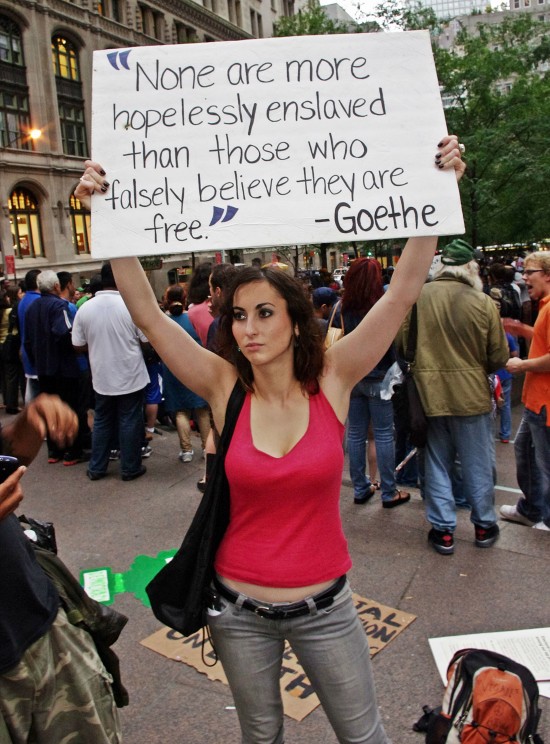The 2008 global economic crisis has been the most severe recession since the Great Depression. Notwithstanding its dramatic effects, cross-country analyses on its heterogeneous impacts and its potential causes are still scarce. By analysing the geography of the 2008 crisis, policy-relevant lessons can be learned on how cities and regions react to economic shocks in order to design adequate responses.
The post Austerity and the slow recovery of European city-regions appeared first on OUPblog.
Greece is not alone in suffering from budget cuts arising from the era of austerity. In the UK, local councils, libraries, museums – all public services have been cut. Criminal Justice has not escaped this cost-cutting. The consequence has been fewer police officers on the streets, less money for legal aid lawyers, and closures of Magistrates courts.
The post Austerity and the prison appeared first on OUPblog.
By Megan O’Neill
It will not come as news to say that the public police are working under challenging conditions. Since the coalition government came to power in 2010, there have been wide-ranging and deep cuts to the funding of public services, the police included. This was the institution which once enjoyed a privileged position as the “go-to” service for political parties to improve themselves in the eyes of the electorate by being “tough on crime” through ever increasing police numbers. Numbers of police officers and staff rose year on year from 2000 to 2010, an increase of 13.7%. All that has now changed, and the most recent statistics show that the police service has now reduced in size by 11%, and is roughly equivalent to where it was in 2001. While police officers themselves cannot be made redundant, vacant positions are not being filled when officers leave or retire. Police and Community Support Officers (PCSOs) can be made redundant, and this has happened in a few areas, as well as vacancies not being filled. What does this mean for being “tough on crime”?
Well, to be honest, not much on face value. As any good first year Criminology student should be able to tell you, the overall crime rate has been falling more or less steadily since 1995. This drop in crime started before police numbers rose, and occurred in other countries as well where police numbers may not have changed to the degree they did in England and Wales. The cause for the drop in crime is the subject of much debate, and will not be pursued in depth here. However, what is clear is that the sheer number of police officers in a police force does not have a direct link with the amount of crime that area experiences. What is more important is what is done with those officers, and this is where my concern with the current state of policing lies.

While the last Labour government regularly pumped up the number of officers to redress their image of being soft on crime, they also made two significant changes to policing practice. One was the introduction of PCSOs in 2002 and the other was the national roll-out of Neighbourhood Policing in 2008. While both may have been derided in the beginning as being more for show than of any real substance, I feel both have made significant changes in the relationship of the police to many local areas and with this has come a reorientation to the police occupational culture itself. Research I have conducted on partnership work and PCSOs suggests that these changes have made some sections of the police more open to working with those outside of their organisation, has enhanced the commitment the police have to crime prevention and long-term problem solving, and has led to better information sharing and relationships between the police and local residents.
To be clear – I am not arguing that all is fine and well in policing. However, the situation we have now is far better than what was the case in the 1980s and 1990s. Rather than “community policing” referring to police officers in panda cars whizzing through residential areas, going from job to job, we now have officers and staff who walk their beats, get to know many of the people and places within it and have the time to attend to the “small stuff”. By this I mean the anti-social, low-level crimes and incivilities which may not set performance targets on fire, but which mean a great deal to the daily lives of thousands of people. Officers, usually PCSOs, can take the time to find out about these concerns and either address the matter themselves or find the most appropriate partner agency to do so (the staff of which they know by name and often have their numbers programmed into their mobile phones). In return, residents start to build trust in their local neighbourhood team, which may develop over time into information sharing of interest to constables and detectives.
However, all this is now in danger of being eroded. The budget cuts mean that the officers and staff who remain in neighbourhood teams have much heavier workloads, including the PCSOs. It is far more difficult now to attend to the “small stuff” and to conduct visible patrols. Partner agencies are also facing severe budget cuts and this will impact on their ability to work collaboratively with the police as they have fewer resources to share. This means that the police lose opportunities to make connections in their local communities and build valuable social capital. Residents are not getting the attention they desire from their local police and so will have fewer reasons to trust them. In addition to these losses to police practice and community relationships is a much less visible but no less significant loss – the reorientation of the police occupational culture. Police officers became more open to working with partners, PCSOs, residents and to consider long-term problem solving once they had experienced the benefits of doing so. Many of the traditional hostilities towards the “other” were reducing noticeably among the neighbourhood officers with whom I have conducted research. This widening of the police world view will, I fear, also be lost in the current budget structures. This is not a savings for policing – it is a very high cost indeed.
Dr Megan O’Neill is the Chair of the British Society of Criminology Policing Network, and a lecturer at the Scottish Institute of Policing Research, University of Dundee. She is the author of “Ripe for the Chop or the Public Face of Policing? PCSOs and Neighbourhood Policing in Austerity” (available to read for free for a limited time) in Policing.
The full article will be available this June in Policing, A Journal of Policy and Practice, volume 8.3. This peer-reviewed journal contains critical analysis and commentary on a wide range of topics including current law enforcement policies, police reform, political and legal developments, training and education, patrol and investigative operations, accountability, comparative police practices, and human and civil rights
Subscribe to the OUPblog via email or RSS.
Subscribe to only law articles on the OUPblog via email or RSS.
Image credit: UK police vehicles at the scene of a public disturbance. © jeffdalt via iStockphoto.
The post The unseen cost of policing in austerity appeared first on OUPblog.

By Mikko Salmela and Christian von Scheve
Nationalist, conservative, and anti-immigration parties as well as political movements have risen or become stronger all over Europe in the aftermath of EU’s financial crisis and its alleged solution, the politics of austerity. This development has been similar in countries like Greece, Portugal, and Spain where radical cuts to public services such as social security and health care have been implemented as a precondition for the bail out loans arranged by the European Central Bank and International Monetary Fund, and in countries such as Finland, France, and the Netherlands that have contributed to the bailout while struggling with the crisis themselves. Together, the downturn that was initiated by the crisis and its management with austerity politics have created an enormous potential of discontent, despair, and anger among Europeans. These collective emotions have fueled protests against governments held responsible for unpopular decisions.

Protests in Greece after austerity cuts in 2008
However, the financial crisis alone cannot fully explain these developments, since they have also gained momentum in countries like Britain, Denmark, Norway, and Sweden that do not belong to the Eurozone and have not directly participated in the bailout programs. Another unresolved question is why protests channel (once again) through the political right, rather than the left that has benefited from dissatisfaction for the last decades? And how is it that political debate across Europe makes increasing use of stereotypes and populist arguments, fueling nationalist resentments?

A protester with Occupy Wall Street
One way to look at these issues is through the complex affective processes intertwining with personal and collective identities as well as with fundamental social change. A particularly obvious building block consists of fear and insecurity regarding environmental, economic, cultural, or social changes. At the collective level, both are constructed and shaped in discourse with political parties and various interest groups strategically stirring the emotions of millions of citizens. At the individual level, insecurities manifest themselves as fear of not being able to live up to salient social identities and their inherent values, many of which originate from more secure and affluent times, and as shame about this anticipated or actual inability, especially in competitive market societies where responsibility for success and failure is attributed primarily to the individual. Under these conditions, many tend to emotionally distance themselves from the social identities that inflict shame and other negative feelings, instead seeking meaning and self-esteem from those aspects of identity perceived to be stable and immune to transformation, such as nationality, ethnicity, religion, language, and traditional gender roles – many of which are emphasized by populist and nationalist parties.
The urgent need to better understand the various kinds of collective emotions and their psychological and social repercussions is not only evident by looking at the European crisis and the re-emergence of nationalist movements throughout Europe. Across the globe, collective emotions have been at the center of major social movements and political transformations, Occupy Wall Street and the Arab Spring just being two further vivid examples. Unfortunately, our knowledge of the collective emotional processes underlying these developments is yet sparse. This is in part so because the social and behavioral sciences have only recently begun to systematically address collective emotions in both individual and social terms. The relevance of collective emotions in recent political developments both in Europe and around the globe suggests that it is time to expand the “emotional turn” of sciences to these affective phenomena as well.
Christian von Scheve is Assistant Professor of Sociology at Freie Universität Berlin, where he heads the Research Area Sociology of Emotion at the Institute of Sociology. Mikko Salmela is an Academy Research Fellow at the Helsinki Collegium for Advanced Studies and a member of Finnish Center of Excellence in the Philosophy of Social Sciences. Together they are the authors of Collective Emotions published by Oxford University Press.
Subscribe to the OUPblog via email or RSS.
Subscribe to only psychology articles on the OUPblog via email or RSS.
Image credits: (1) Protests in Greece after austerity cuts in 2008. Photo by Joanna. CC-BY-2.0 via Wikimedia Commons. (2) A protester with Occupy Wall Street. Photo by David Shankbone. CC-BY-3.0 via Wikimedia Commons)
The post Collective emotions and the European crisis appeared first on OUPblog.

Things are bad all over, with economies slowed debt levels have become a more accentuated concern and all eyes are turning to public services. No program or service is safe from scrutiny, it seems, and in Brittan the fight is on to keep the nations libraries.
According to an annual report from the Chartered Institute of Public Finance and Accountancy the country has lost 347 libraries in past two years, down to 4,265. As grave as this sounds the news becomes more bleak when the figures for library attendance partly justify the closures. Visits to libraries across the UK have also dropped 2.4% in the past year and 6.7% compared with five years ago; and borrowing rates are down comparable figures.
So now the fight is on, with opponents claiming that: shutting down libraries is no way to improve public education, libraries also provide internet access to the less privileged, meeting places for social groups are a valuable community service, and they provide a service to job seekers looking to hone their resumes. Those in favor of the reductions to public spending point the aforementioned statistics, adding that not all libraries should be closed only the ones no longer being used; the same study indicates that while many libraries are being closed the largest libraries are mainly staying open. The Norfolk and Norwich Millennium library had 1.18m books issued and 1.34m visitors alone in the past year.
So is it simply a redistribution of resources, or are rural British getting the short end of the stick? And what are we to do about it? You can follow this story in The Guardian.
It was hot today in paradise, even with mild breezes. The first hint of orange blossoms on the Flame Trees.
___________________________________
Austerity-what a nightmare. Tonight there is a public hearing in Kagman--conducted by Rota Sen. Jovita Taimanao. (I can't make it-other commitments to my daughter.)
The administration/and the Covenant legislators propose a plan that will lose the PSS $16million dollars immediately and cause other harm. In order to save about $4 to $5million.
Senator Paul Manglona proposes an end to protections for governor, legislators and judicial salaries--but such proposal couldn't take effect against any one already in their position during this present term.
Meanwhile, legislators are getting $4,200/day for "subsistence" pay when they have to be on another island other than their home for legislative sessions.
Meanwhile, legislators are getting paid as full-time employees, when we could easily get by with a part-time legislature.
Meanwhile-does anyone remember? The Fitial administration may still be paying $50,000/month to a lawfirm, Jenner and Block, to fight the CNRA, so we can "appeal" Judge Friedman's decision.
The Fitial Administration's claim for austerity is a sham.






Spam.
where is the federal investigation into fitial allowing the federal detainee to be released for his personal massage? i can't believe that they have their heads buried in the sand; meanwhile the citizens of the cnmi are dying... there is something seriously wrong with the fitial administration! hopefully they will take him out, sooner than later, so we can start the real work to get us out of this quagmire we are in.
Is there truth that Fitial commuted the 20 year sentence of drug dealer David Tanaka Diaz and that Diaz is now a free man?
David Tanaka Diaz was up for parole. Apparently he was granted parole and is now out of prison.
This is action by the parole board, not the governor, as I understand it.
Okay, so now I'm confused. David Tanaka Diaz was sentenced to 30 years in jail; the last 5 years were suspended, but the 25 years were supposed to be without parole. Saipan Tribune article
So how does he get parole? I'm still trying to find out what happened.